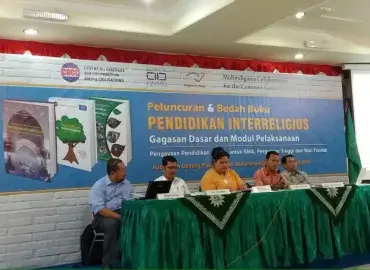KAICIID is working closely with Indonesian partners to design an instruction manual to provide educators with alternative materials on interreligious dialogue. The manual will help teachers, lecturers and religious leaders develop and strengthen the interreligious dialogue movement.
The workplan for the manual, designed through KAICIID’s MultiReligious Collaboration for the Common Good programme, is a result of the needs expressed by KAICIID’s local partner, the Center for Dialogue and Cooperation among Civilisations (CDCC) under the overall cooperation through Religions for Peace (RfP). The manual will be produced through a series of workshops with MCC field officer oversight, drawing on the experience of more than 40 Indonesian government officials, experts, academics and practitioners – the first of which took place 9-10 June in Jakarta.
The project is essential in the Indonesian context because of the immense amount of religious diversity, as the archipelago has more than 200 indigenous religions in addition to the major world religions. Indonesia is known for its religious tolerance, but many in Indonesia feel that further support in the field of interreligious dialogue in the curriculum is needed.
Wiwin Rohmawati, KAICIID’s local expert who helped design the project and was instrumental in organizing the workshop, has extensive experience in interreligious dialogue in Indonesia and has taken part in research on interreligious dialogue education in Indonesia. She, as well as many of her peers, was especially concerned with the emergence of radical, exclusive teachings in both formal and informal education in Indonesia, as a radical religious group has also recently proposed a curriculum.
“If you want to help Indonesia, you should help in education, especially because the development of interreligious education is very important here,” she said. “The radical groups are growing– not only in Indonesia but in the world. Therefore, we cannot wait anymore to do this.”
The workshop will be followed by another meeting 30-31 July 2015 in Yogyakarta, in which 14 participants from the original group of experts will discuss the results of the first workshop in more detail. After the next workshop, four to six experts will be chosen to write the manual.
The MCC programme supports practical cooperation among religious communities toward their shared goals through dialogue training, impact-tracking and communication of results to policy makers and wider publics. KAICIID is working with partners and RfP counterparts to strengthen and expand dialogue platforms, support practical dialogue activities and to build the capacity of local dialogue actors.
Together with Religions for Peace (RfP) and the Centre for Dialogue and Cooperation among Civilisations, KAICIID launched…

![[file:field-file-image-alt-text]](/sites/default/files/styles/features_940_630/public/approved_2.jpg.webp?itok=Tjj3-GYu)
